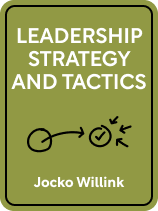

This article is an excerpt from the Shortform book guide to "Leadership Strategy and Tactics" by Jocko Willink. Shortform has the world's best summaries and analyses of books you should be reading.
Like this article? Sign up for a free trial here.
Why is humility important in leadership? How do teams benefit from humble leadership?
After serving for 20 years as a U.S. Navy SEAL, Jocko Willink developed a unique leadership philosophy based on humility. In Leadership Strategy and Tactics, he explains why humility is important in leadership if you want your team to follow you and succeed.
Keep reading to learn why humility is important in leadership, based on examples from Willink.
Humility in Leadership, According to Willink
According to Jocko Willink, by learning how to lead well, everyone on your team benefits and you’ll achieve collective goals more quickly. Willink says the purpose of his book, Leadership Strategy and Tactics, is not to advance your career but, instead, to help your team achieve success. According to him, one of the main reasons why humility is important in leadership is because, by acting in service of others through leadership, you’ll not only succeed as a leader, but as a person.
(Shortform note: Willink doesn’t explain why helping others will lead to your success as a person or what it means to be a successful person, but perhaps he means that helping others through leadership will give your life meaning. Research shows that helping others leads to a deeper sense of meaning because it strengthens our relationships. Helping others affirms your own sense of value because it makes you feel autonomous, competent, and connected to others.)
To Willink, humility in leadership means recognizing that you’re not more important than anyone on your team. He argues that you can’t be a good leader if you aren’t humble, because without humility, your team won’t follow you. We’ll first discuss how humility inspires your team to follow you by earning their respect. Then, we’ll explain why humility is essential to make informed decisions and grow as a leader.
Why Humility Is Important to Earn Respect as a Leader
When you’re in a leadership position, don’t ever consider yourself above your team. Doing this could cause your team to resent you and, as a result, they won’t follow you with much enthusiasm. Instead, work alongside your team with humility. If you demonstrate humility, Willink says you’ll influence your team to cooperate with you to achieve a common goal. This is because acting humbly will earn you respect, and when people respect you, they follow you.
(Shortform note: Willink proposes that you can earn your team’s respect by displaying humility. A slight nuance, research suggests that showing humility influences your team to trust you, but only if they suspect your motivations are honest and well-intended. For example, if your team suspects you’re acting humbly solely because you want them to think highly of you, the plan could backfire.)
Here are three important ways you can practice humility in leadership and earn your team’s respect:
1) Don’t use condescending language. Just because you might be in charge of other people, it doesn’t mean you’re better than them. Rather, Willink says you should view your team as equally valuable individuals who deserve respect. So, you should speak to your team in a way that reflects this perspective. For example, if someone at work compliments you for leading a project successfully, avoid saying something that denotes a higher status, such as, “That’s why they pay me the big bucks.” Instead, consider saying something that places you on equal ground with your colleagues, like, “That project was successful because of our whole team’s contributions!”
(Shortform note: Condescension isn’t limited to the words you use. Experts say you can also convey condescension in the style of your delivery and your body language. Be mindful not to speak excessively slowly when you’re explaining something to someone. This might be perceived as “dumbing down” whatever you’re explaining. As for body language, avoid yawning, sighing, or tapping your fingers when you’re listening to someone else speak. These behaviors convey that you don’t think what the other person has to say is valuable.)
2) Get your hands dirty. Because you’re equal to the people on your team, no task is below you. For example, if you’re in charge of an office, don’t consider yourself above necessary maintenance chores like taking out trash, replacing printer ink, or cleaning bathrooms. Willink says doing daily tasks with your team will also give you an opportunity to connect with and learn about them (we’ll further discuss how to build relationships with your team in a later section).
(Shortform note: Many successful leaders say that you should never assign someone a task that you’re unwilling to do yourself. This is a good measure of your humility and also whether or not the task itself is demeaning or inappropriate.)
3) Respond to conflict by giving a compliment. When you feel challenged by someone, it’s tempting to defend your pride by talking yourself up and diminishing the other person. Instead, Willink says to give the other person praise. For example, let’s say a coworker brags that they always arrive at the office earlier than you do. Instead of pointing out that you work later than them every day, or that you work harder than they do, tell them that you’re grateful they arrive so early to get the office up and running for everyone else. This act will demonstrate confidence. The person challenging you will respect this confidence and be more willing to follow you.
(Shortform note: To deliver an effective compliment, make sure it is sincere. If people think you don’t mean what you say, a compliment can backfire by weakening the trust in your relationship. Make your compliments more sincere by noting something specific. It’s easier to do this if you regularly pay close attention to the good things your team does. This not only leads to more meaningful compliments, but it also forces you to look at your daily work in a more positive way.)
Why Humility Is Important for Leadership Decisions
Practicing humility as a leader not only earns your team’s respect, but it enables you to better listen to your team. If you’re too prideful to accept criticism from others or to budge from your own ideas, you’ll waste time arguing with your team and you’ll miss out on ideas that are better suited to handle a situation. Additionally, if you resist advice from people with valuable experience and insight, you won’t be as informed as you could be, and the quality of your decisions will suffer. Instead, humility opens you up to helpful information so that you can make better leadership decisions. In this section, we’ll explore three ways to accept criticism with humility.
First, accept criticism from anyone. It can be hard to accept criticism from people you don’t like or that you don’t think are qualified to give you advice. However, Willink says it’s worth doing because applying what you learn from criticism can make you a better leader. To keep from taking criticism too personally, Willink recommends you objectively focus on the big picture. In this case, the “big picture” to keep in mind is improving as a leader.
(Shortform note: To take criticism well, consider these expert tips: Prepare general responses to criticism in advance. It can be difficult to respond to criticism in the moment, so having some prepared phrases can keep you from freezing up as you gather your thoughts. Another thing to consider is that the criticism you receive may not be aimed at you, but instead, your role. Realizing this can prevent you from taking criticism too personally and becoming emotional. If you take some of the heat off of yourself, it will be easier to stay calm and think clearly.)
Second, don’t commit to your ideas. If your idea conflicts with another person’s, instead of trying to prove that you’re right, try to objectively assess which idea is actually better. If your idea is significantly better, this should be apparent to the other person with more discussion. If your ideas are very similar, go with the other person’s idea. By doing this, you’ll give them ownership, which will encourage follow-through, and you’ll also build trust with them. This will strengthen your relationship and, in turn, strengthen your team.
(Shortform note: To more easily let go of your own ideas and execute someone else’s, one expert says it helpful to realize that you don’t need to agree with their idea, you only have to commit to the actions required to carry out their plan. This is also true when certain people on your team don’t agree with your plan. Don’t waste energy explaining why they should conform to your idea or why they’re wrong for believing what they believe. Respect their opinion and ask them to help you carry out your plan anyway. By not pushing too hard to bring someone on board with your way of thinking, you’ll save time and avoid insulting anyone for their ideas.)
Third, learn from leadership examples in your daily life. If you think you don’t need to put any effort into improving because you’re already a great leader, Willink says your leadership skills will stop developing while the problems you face continue to evolve. Instead, be humble and continue to grow as a leader by studying. To do this, actively look for leadership examples in what you read or during your daily activities, and learn from what you experience. For instance, if you’re shopping for clothes, pay attention to how the store’s manager interacts with other employees and how the employees react to their leadership. Ask yourself whether the manager’s approach seems to be effective and consider why it is or isn’t.
(Shortform note: As you look for examples of leadership to learn from in your daily life, consider the areas of leadership where you’re lacking and keep them top of mind. This will help you notice and learn from leaders that demonstrate strength in those areas. Additionally, ask leaders you respect how they approach the areas you’re not confident about.)

———End of Preview———
Like what you just read? Read the rest of the world's best book summary and analysis of Jocko Willink's "Leadership Strategy and Tactics" at Shortform.
Here's what you'll find in our full Leadership Strategy and Tactics summary:
- A former US Navy SEAL's advice on how to be a good leader
- Three ways you can practice humility and earn your team’s respect
- Why you must always tell the truth, even when it's harsh






